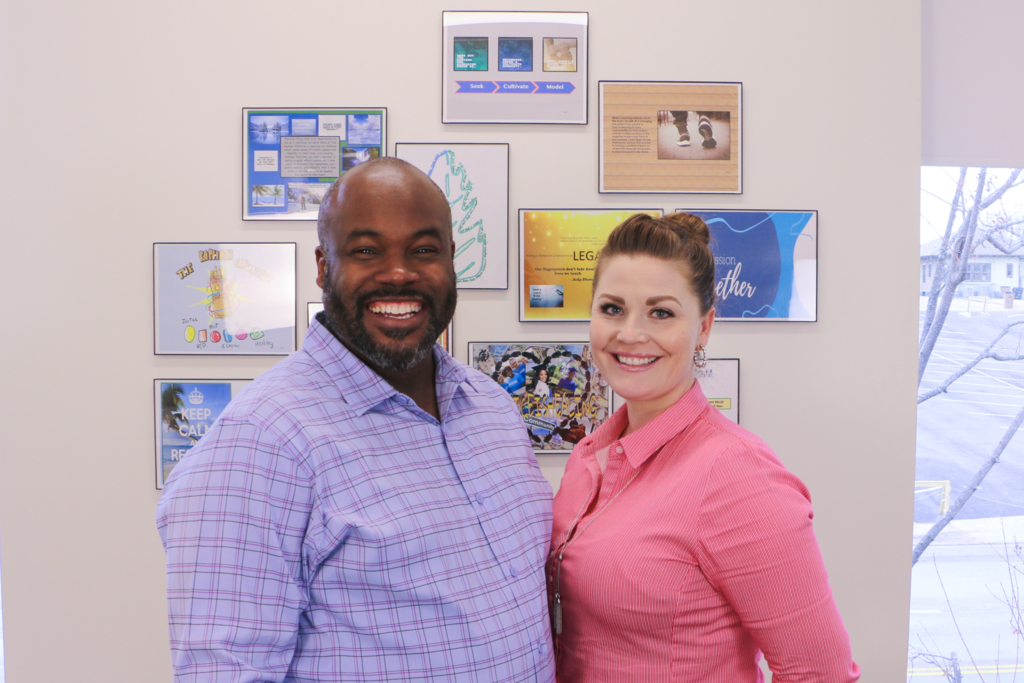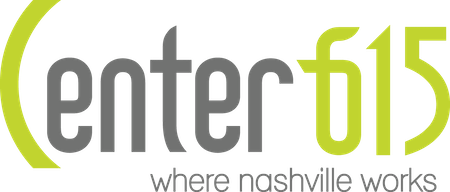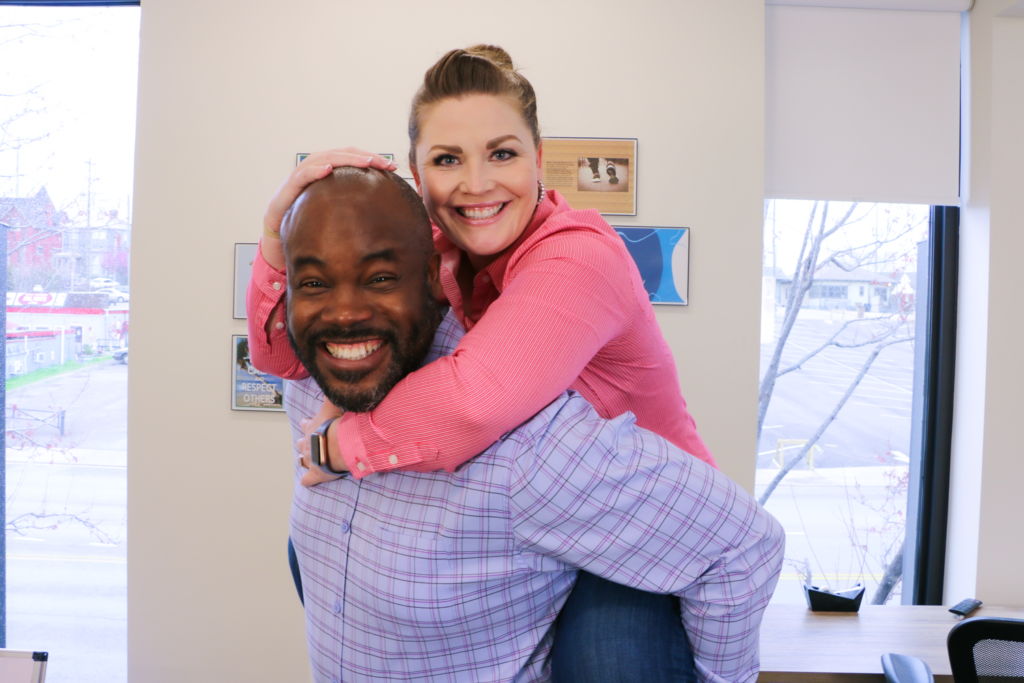Raphah Institute is a multi-faceted justice and equity entity that brings healing to the Nashville community.
Less than a year after its inception, Raphah Institute became a Center 615 member in February 2018.
Both Travis Claybrooks and Ashlee Sellars, Raphah’s leaders, exude fun-loving energy in everything they do. Just ask anyone who was in our Fall ‘19 kickball league.
Newly engaged and soon-to-be homeowners Travis and Ashlee answered our burning questions about Restorative Justice and exciting projects Raphah has up their sleeves. Read on to find out more.
In your own words, what is Restorative Justice?
Ashlee: In the framework of true Restorative Justice, we are all one community. So what do we do when something harmful happens in our community? How do we hear everyone’s needs, meet those needs, and remain a community after those things have happened? That’s kind of the space we are at Raphah.
Travis: Raphah is a contemporary application of the centuries old concept—an ethos—of what Ashlee just described. Raphah looks at how to best implement and apply Restorative Justice with our current justice and police systems instead of with elders.
What do you guys appreciate most about Center 615’s campus?
Ashlee: We work with families who may not feel at ease in sterile office environments. It’s great to see the amount of comfort that our families feel when they come into this building. Feeling safe and welcome in a fun place where the families can enjoy colorful artwork and murals, go outside to the courtyard, play ping pong, etc. creates an openness where they are quicker to talk to us.
Travis: This entire building is a part of our business. It’s not where we just rent an office suite.
Raphah’s website has a list of several prominent locals’ names connected with you. How did you receive that support?
Travis: Each of those names has one common goal. Our work isn’t about our work, it’s about a community of people that we all serve and care about, so the partnership has been natural. When you have a common interest, it becomes easy.
Can you tell me more about your Early Embrace program?
Travis: Let me emphasize that everything we do is in partnerships. We rarely do anything by ourselves. Secondly, there’s no empirical data on this, but I’d say 100% of the kids in the RJ (Restorative Justice) program had a poor early learning experience. Early Embrace asks, “What if we could go upstream, confront that issue, and reimagine the early learning experience, especially in communities where they’re least likely to get good early learning access?”
A study on the Cumberland View MDHA property showed the top barriers to employment for residents was transportation, followed by childcare. The top barrier for childcare was affordability, followed by transportation. So you have this crazy loop. “I can’t get a job because I don’t have childcare. Even if I had childcare, I couldn’t afford it because I don’t have a job.”
However, there is a group of folks in the neighborhood who keep kids. But they are some of the most under-resourced, under-supported early learning providers in the city. And these groups that provide childcare for their neighborhood all over the city!
Nashville needs community equity of access. So what if we could bring a radical amount of support to that network of early learning providers, to be super-resourced, providing the most excellent early learning to kids in that neighborhood?
Right now, these early learning providers can’t get DHS (Department of Human Services) reimbursements because they need a license to get that funding. Living in the projects makes it almost impossible to meet the requirements for the licensing. So we signed an MOU (Memorandum of Understanding) with the MDHA (Metropolitan Development and Housing Agency) to explore what it would look like to support the home-based childcare providers in a meaningful way to be able to provide their service to the community. Having these childcare homes would also take transportation out of the equation.
Since it would actually be more expensive, in terms of overhead, to open a childcare center, Early Embrace would completely change the early learning landscape in Nashville if we could scale that. So we’re piloting this model in Cumberland View with the idea of scaling it to every housing project in Davidson County. Right now we are applying for a $20 million grant from the Kellogg Foundation to scale in the next 2 years.
Travis, can you tell me how being a former police officer and pastor has shaped what you do today with Raphah?
Travis: I care a lot about people. I think it’s just in my blood. And I’m a systems thinker, a strategic thinker. It’s easy for me to quickly see what’s broken in pretty much anything. As a police officer, I realized there are a lot of other issues that impact why a person might be committing a crime. Being a criminal is not linear.
From a pastoral framework, I was already looking for something higher, something more. The core question was “What do you do—as a bystander—for the person who has the least capacity to do for themselves and is the most oppressed by others?” Everything I do rises and falls on the answer to that question. Why should I have concern about anything less?
Also worth mentioning, I went to med school but failed—it was devastating. But it’s crucial to not let failure completely destroy your life. One of the big reasons I wanted to go to med school was to put myself in a financial position to be able to do work in the community. I didn’t want to depend on other people to give me money, but I wanted to use it as I saw fit. That failure was a very humbling experience. It made me see the value in community and realize that to do community work, you need community.
Ashlee, how has your personal experience in the prison systems helped shape what you do with Raphah?
Ashlee: One young girl we helped Googled my name, pulled up my story, and asked “Is this you?! Why didn’t you tell me from the beginning? I would have trusted you so much sooner!” Though, the families we serve don’t know my story because it’s not about me.
But we have moments internally with the team when we recognize things going on. We might personally relate with it, and that helps us strategize a plan for the families based on our experience.
All the people who work with Raphah have some type of life experience—direct or indirect—that drives them to be involved in RJ. But at the end of the day, we’re here to see how we can support and serve others. If there are moments where I feel it’s important to share my personal story, then I will, if it means being able to say, “I think I understand what’s happening.”
Ultimately, we aim to reassure people that a community accepts them with all judgements removed. There is love in community. That is what people strive to have, and that is what we strive to give.

Ashlee and Travis, in both your podcast interviews, one recurring theme is voice. Can you tell me a story where you witnessed someone’s voice heard by the right people?
Ashlee: Yes! I can tell you about a young man who had gone through and graduated from our RJ program. In school, he needed help with an incident, so we went to the school with him to support him.
First off, it’s huge for a young person to decide if they are going to advocate for themselves—even more so if they feel like they have people to advocate for them. That was the first step of voice, feeling like he could have a voice, and that we would listen and stand with him.
The school was originally going to expel him. The story was quite ridiculous, and they assured us he couldn’t return until he would have been 19. But the likelihood of a young adult returning to High School at that age…it’s not likely he would have graduated. After advocating for him, the school called back, admitted they made a mistake, and said they would let him back in.
He ended up graduating High School, and he was so excited to show us his photos in his cap and gown! And all that started with voice, with realizing that had been welcomed back into a community and that he had people who loved him, accepted him, would advocate for him, and believed him.
Travis: Another instance of voice was a woman who experienced very violent trauma. We heard her story during a training we had. Nearly 20 years after the trauma, she still has PTSD and anxiety. Though what stuck with me was she said, “My family got tired of hearing about it.”
There is so much value in being able to freely say, “I want someone to know how something impacted me.” Restorative Justice is a process that allows that to actually happen with the person who has actually caused it. And that creates a mutual benefit.
A very difficult moment can be a very beautiful moment when voices get to be heard, stories can be told, and healing can be felt.
Center 615 would like to thank Travis Claybrooks and Ashlee Sellars for allowing us to interview them and share their and Raphah’s story!




